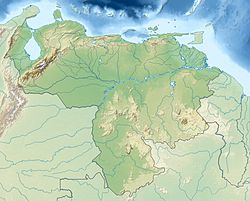Murisipán-tepui, also spelled Murosipán or Murochiopán, is one of the four main tepuis of the Los Testigos chain in Bolívar, Venezuela.[1] Looking west to east, it is the second major peak of the massif and is connected to the next two—Tereke-yurén-tepui and Kamarkawarai-tepui—by a common basement (the westernmost peak, Aparamán-tepui, is relatively isolated by comparison). Murisipán-tepui has an elevation of around 2,350 metres (7,700 ft) and a summit area of 5 km2 (1.9 sq mi). The mountain's mostly bare summit plateau has a small, seasonal lagoon near its centre.[1]
| Murisipán-tepui | |
|---|---|
| Highest point | |
| Elevation | 2,350 m (7,710 ft)[1] |
| Coordinates | 05°52′11″N 62°04′32″W / 5.86972°N 62.07556°W |
| Geography | |
| Location | Bolívar, Venezuela |
In his 1978 book, La Vegetación del Mundo Perdido, Charles Brewer-Carías applied the name Murochiopán-tepui to a smaller lateral peak of Aparamán-tepui (05°52′32″N 62°06′48″W / 5.87556°N 62.11333°W), calling the high summit immediately east of it Tereke Yurén-tepui and the tiny peak east of that, Tucuy-wo-cuyén-tepui. Subsequent authors have generally used Murisipán-tepui (or its variants) for the second of the four main peaks, and Tereke-yurén-tepui for the third, with the lateral mountain of Aparamán-tepui going unnamed.[1]
The frog species Anomaloglossus murisipanensis is only known from Murisipán-tepui.[2]
See also edit
References edit
- ^ a b c d Huber, O. (1995). Geographical and physical features. In: P.E. Berry, B.K. Holst & K. Yatskievych (eds.) Flora of the Venezuelan Guayana. Volume 1. Introduction. Missouri Botanical Garden Press, St. Louis. pp. 1–61.
- ^ Frost, Darrel R. (2014). "Anomaloglossus murisipanensis (La Marca, 1997)". Amphibian Species of the World: an Online Reference. Version 6.0. American Museum of Natural History. Retrieved 15 June 2014.
